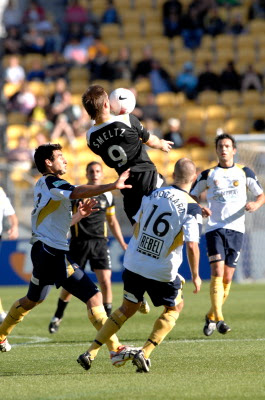Van Egmond's Victory
IF any further evidence was needed of the importance of the manager to the success of a football team, then it was there in bucket-loads at yesterday's v3 F3 derby grand final.
While Gary van Egmond had a load of luck 93 minutes and 20 seconds in, just 10 seconds before Mark Shield's final whistle was due (three minutes of stoppages plus the 30 seconds for Denni's stoppage time introduction), the fact is that van Egmond, more than anyone, delivered Newcastle's first ever domestic football title.
While Con Constantine provided the backing and Joel Griffiths worked the space and provide the goals, it was van Egmond's eye for detail, his decision-making, that invariably was on the mark, that did the trick.
Yes, he stuffed up, badly, in the major semi second leg a fortnight ago, but the mark of a good manager is to get it right more times than not, and that's exactly what 'Dutchy' has been doing from day one at the helm at Newcastle.
Just over 13 months ago, 14 weeks into his tenure, I put together this detailed dissection of his work up until that point. Then, a month or so ago, I noted at the bottom of this piece that van Egmond is arguably at the head of the local pecking order for a national team gig.
Not now, perhaps, but surely if he's fortunate enough to serve some time overseas, as he hinted he is keen to do in this interview with ESPN's Jason Dasey earlier this month. More recently, of course, Craig Johnston has suggested he is good enough, and others have been jumping on the van Egmond bandwagon.
If it continues to roll-on, no doubt we will soon have a local manager capable of dealing with the cat and mouse, cut-and-thrust of international football.
Last night, the stakes as high as they get at this level, he took his legend to another level.
Hitherto he has used a 4-2-3-1 almost exclusively, but last night, recognising that there was little these two sides didn't know about each other after playing five times already this season, he threw a spanner into the works, switching to a three-man backline.
Travelling between the church service and reception of my sister-in-law's wedding, I tuned in to SBS Radio's coverage of the game, where the on the spot Scott McIntrye was interviewing Mariners squad member Brad Porter at half time.
Porter admitted that van Egmond had caught the Mariners out by switching to a 3-4-3.
Having watched a full replay a little while ago, in my view it effectively did two things;
1. nulified the threat of Sasho Petrovski and John Aloisi by deploying twin markers Adam Griffiths and Jade North as stoppers, covered by the courageous Andrew Durante, and
2. with youngsters Tarek Elrich and Adam D'Apuzzo pushed up into midfield on the right and left respectively, the Mariners width, such a key ingredient of their success a fortnight ago, became non-existent. Suddenly Adam Kwasnik and Greg Owens had to contend with the more advanced position of the Jets fullbacks.
It was a master-stroke from van Egmond, and I sense the Mariners didn't see it coming. They might have if they'd read David Lowe's insightful tactical preview on the eve of the game, where the former NSL front-man hinted at the possibility of a re-shape.
Having read it myself, I thought van Egmond would be nuts to change things around at this late stage, but he is clearly a man of his own mind, and the Newcastle-based Lowe might have had a bit of insight into it.
Another master-stroke was the deployment of Joel Griffiths in the playmaker role in front of Stuart Musialik and behind Mark Bridge. Griffiths’s ability to play the ball into the space between midfield and attack kept Mile Jedinak chasing his tail and the Jets’s link between the midfield and attack flourishing.
While the Mariners tried to unsettle Musialik by surrounding him with the physical John Hutchinson and either Petrovski or Aloisi working back, van Egmond had other ideas. By stretching the two Mariners front men by pushing Adam Griffiths out to the right and Jade North out to the left, suddenly Musialik had a bit of space and was able to keep the ball moving.
Out on the right, Elrich tucked in and Song provided the width, combining beautifully, while D’Apuzzo and Thompson did well on the other side.
The Jets were in control in the middle, at the back and out wide, while their movement in the front third was frustrating the Mariners rearguard.
The only thing missing was a goal, which eventually came on the back of a Tony Vidmar error, such a sad way for the Aussie football stalwart to bow-out.
After that the Mariners pressed, the Jets shut-up shop and the stoppage-time drama unfolded, James Holland getting away with one.
Danny Vukovic lost his bundle and, for now, has paid a hefty price, while John Aloisi and his Mariners crew left frustrated.
Ultimately though, on the day, they were outplayed by the better, more thoughtful team, who had their manager to thank for it all.

